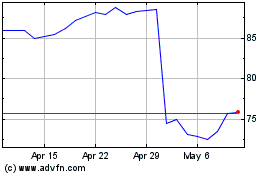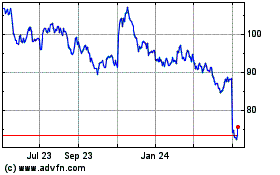Today's Top Supply Chain and Logistics News From WSJ
October 17 2016 - 6:54AM
Dow Jones News
By Paul Page Sign up:With one click, get this newsletter delivered to your inbox.
The jungle-clad provinces of eastern Congo are becoming some of
the most important, and dangerous, sites in the global coffee
supply chain. Congo is attracting some of the biggest names in
coffee, including a $1 million investment from brewing giant
Starbucks Corp., the WSJ's Alexandra Wexler reports, even as a war
that's claimed more than five million lives in the past 20 years
rages in the shadows of agriculture suppliers. The companies are
responding to growing demand for specialty coffee, which accounts
for one of every two cups sold in the U.S., encouraging exporters,
roasters and retailers to go where the potential is huge -- and so
are the risks. The many challenges of doing business in Congo
include death threats, extortion and kidnappings, many of which
occur near where specialty coffee is grown. Congo's
specialty-coffee production has surged to as much as 960 tons a
year from almost nothing in 2008, and foreign-based roasters are
spending big money to pool farmers, teach them best practices and
finance next season's crop. That's bringing some prosperity to the
country while testing the limits of supply chains in one of the
world's most unstable regions.
Hanjin Shipping Co.'s latest sale may be a matter of survival
for the debt-ridden ocean carrier . Hanjin is reaching out to major
European shipping companies as it looks for a buyer for at least
five of its vessels, the WSJ's Costas Paris reports. The effort is
part of the South Korean operator's bid to raise funds to finish
unloading stranded cargo, pay off creditors and restructure its
operations. The ships are among the biggest that Hanjin owns and
are among the remnants of a fleet that has been withering as ship
owners reclaim chartered vessels. A South Korean bankruptcy court
also plans to dispose of the firm's sales and marketing network for
Asia-U.S. routes and some ships. The sales are coming in a tough
market where vessel values have been hurt by excess container
shipping capacity. But Hanjin executives hope the sales bring
enough cash for the company to remake itself into a regional Asian
carrier.
Chinese parcel delivery carrier ZTO Express will test the
investment world's appetite for e-commerce logistics. The
seven-year-old, Shanghai-based company begins its investor road
show this week for a planned initial public offering that would
sell 72.1 million shares at $16.50 to $18.50 apiece. At the top end
of the range, and the WSJ's Alec Macfarlane reports that would
bring $1.3 billion and signal confidence in a Chinese e-commerce
market that counted $609 billion in online sales last year. ZTO
would beat trucker Schneider National Inc. to the market with its
planned public offering and break a six-year drought in IPOs in the
logistics and cargo transportation arena. With major parcel
business for Chinese e-commerce giants Alibaba Group Holding Ltd.
and JD.com Inc. and an operating profit margin of 25.1%, the
company has big numbers behind its target price.
SUPPLY CHAIN STRATEGIES
Indonesia may have the bigger foothold in the smartphone supply
chain it's been looking for. BlackBerry Ltd.'s decision to license
software and outsource handset production globally represents a win
for Indonesia, which is also the biggest market for the Canadian
company's handheld devices. The WSJ's Resty Woro Yuniar reports
that Blackberry's pact with an affiliate of the country's biggest
wireless carrier will have the Indonesian partner produce, promote
and distribute all Blackberry-brand devices in the country. The
plan helps Blackberry meet Jakarta's rules for local content and to
focus on its plan to focus on software rather than making
smartphones. Indonesia has loosened those rules somewhat, and
Blackberry's decision suggests other smartphone companies and their
critical components makers may find the country a more attractive
node in electronics manufacturing and distribution channels.
QUOTABLE
IN OTHER NEWS
The U.S. producer-price index, a gauge of U.S. business pricing,
rose 0.3% in September. (WSJ)
The Obama administration took new steps to loosen U.S. sanctions
against Cuba and allow for greater trade between the nations.
(WSJ)
The U.S. Treasury Department sharply toned down its criticism of
China and other Asian exporters in its latest currency report to
Congress. (WSJ)
Delta Air Lines Inc. cargo revenue fell 15%, or $29 million, in
the third quarter and was off 20% in the first nine months of the
year. (WSJ)
Tesla Motors Inc. and Panasonic Inc. are extending their
cooperation with an agreement to produce photovoltaic cells and
modules in Buffalo, N.Y. (Associated Press)
Japan's government wants the Parliament to ratify the
Trans-Pacific Partnership trade agreement quickly to keep the pact
alive amid opposition in the U.S. (WSJ)
U.K. auto parts suppliers fear the impact of new tariffs
following Brexit may force them to relocate overseas. (Financial
Times)
Southern California ports and the U.S. Department of Commerce
will work together to study new information technology for ports at
the University of Southern California. (Long Beach Press
Telegram)
A U.S. coal company is exporting to Asia through a Canadian
terminal after failing to gain port access in the U.S. Pacific
Northwest. (Associated Press)
Canadian Pacific Railway Ltd. plans to release a "supply chain
scorecard" on the railroad's handling of Canada's grain harvest.
(Progressive Railroading)
An alliance including the humanitarian Vaccine Alliance and
United Parcel Service Inc. began drone delivery of medical supplies
in Rwanda. (Lloyd's Loading List)
The city of Seattle, private retailers and parcel carriers are
backing a University of Washington study on improving e-commerce
order delivery in cities. (Seattle Daily Journal of Commerce)
Indian officials say they are working with Germany on having
German companies help improve the country's infrastructure,
including improved rail-port connections. (Economic Times)
The Port of Oakland's Trapac LLC cargo terminal plans to double
the size of its container handling operation. (East Bay Times)
A survey shows 75% of Americans believe commercial parcel
delivery by drone will be a reality within five years. (IoT
Daily)
Oil tanker operator Frontline Ltd. canceled an order for four
large vessels from South Korean carrier STX Offshore &
Shipbuilding. (Splash 24/7)
The U.S. military's logistics effort to provide relief in
hurricane-hit Haiti involves tough negotiations to move supplies
inland. (Stars and Stripes)
ABOUT US
Paul Page is deputy editor of WSJ Logistics Report. Follow him
at @PaulPage, and follow the entire WSJ Logistics Report team:
@brianjbaskin, @lorettachao, @RWhelanWSJ and @EEPhillips_WSJ, and
follow the WSJ Logistics Report on Twitter at @WSJLogistics.
Subscribe to this email newsletter by clicking here:
http://on.wsj.com/Logisticsnewsletter .
Write to Paul Page at paul.page@wsj.com
(END) Dow Jones Newswires
October 17, 2016 06:39 ET (10:39 GMT)
Copyright (c) 2016 Dow Jones & Company, Inc.
Starbucks (NASDAQ:SBUX)
Historical Stock Chart
From Mar 2024 to Apr 2024

Starbucks (NASDAQ:SBUX)
Historical Stock Chart
From Apr 2023 to Apr 2024
